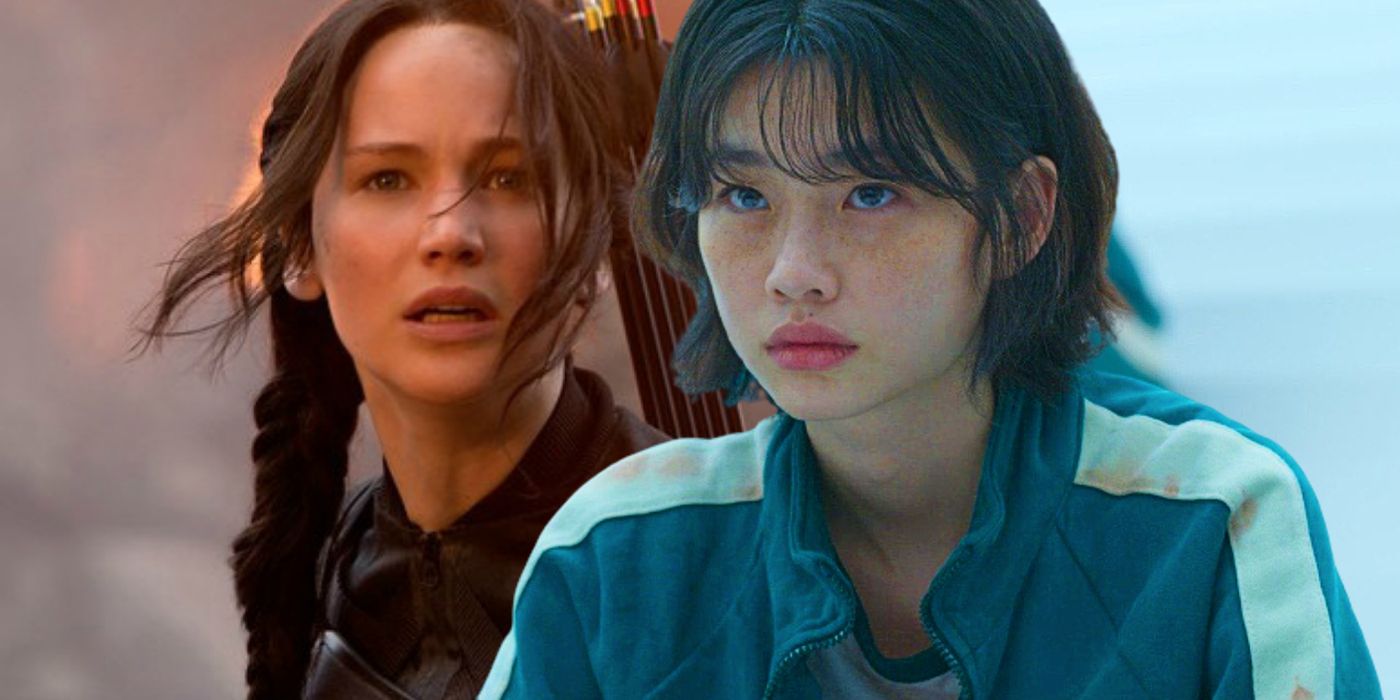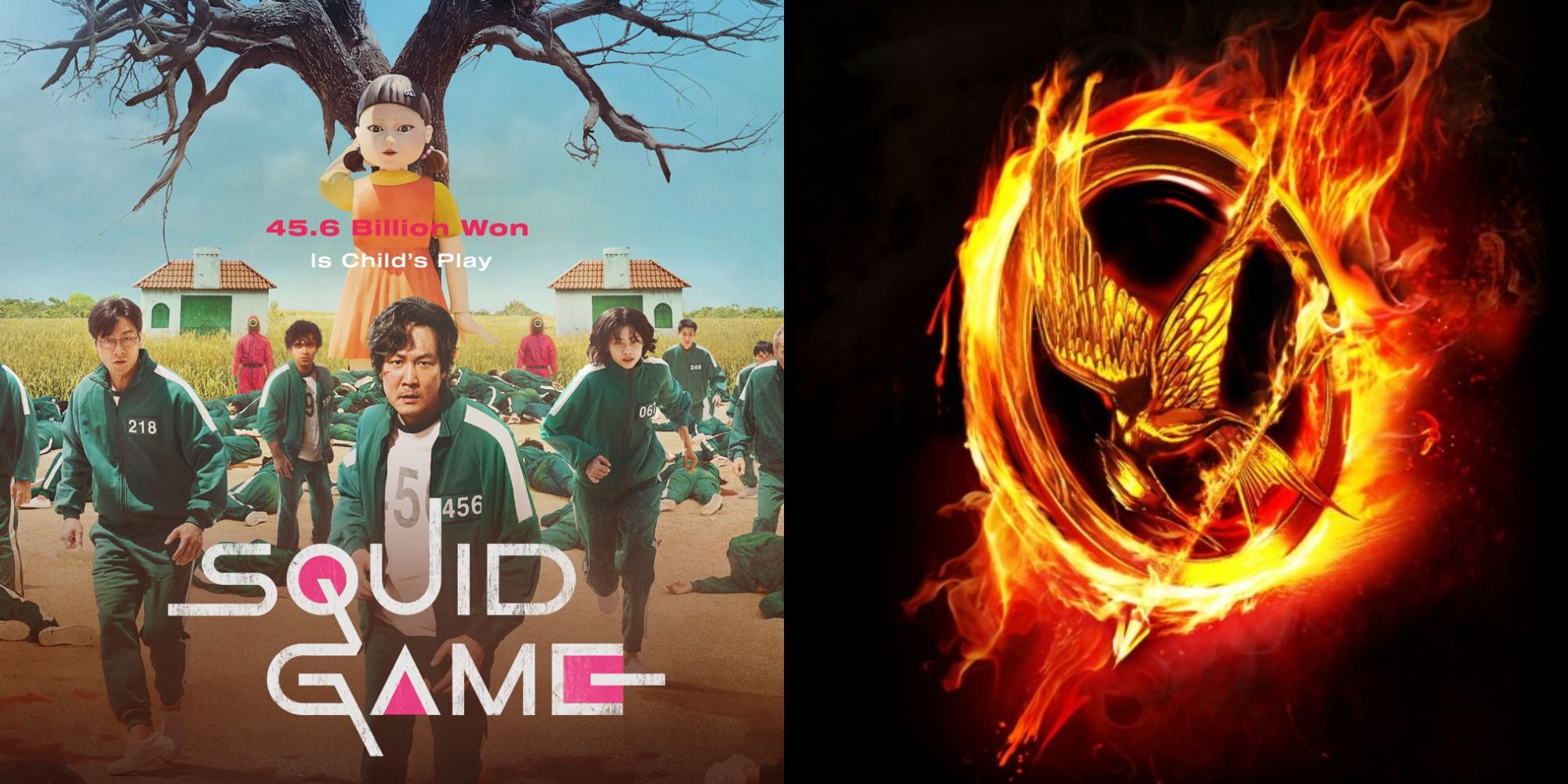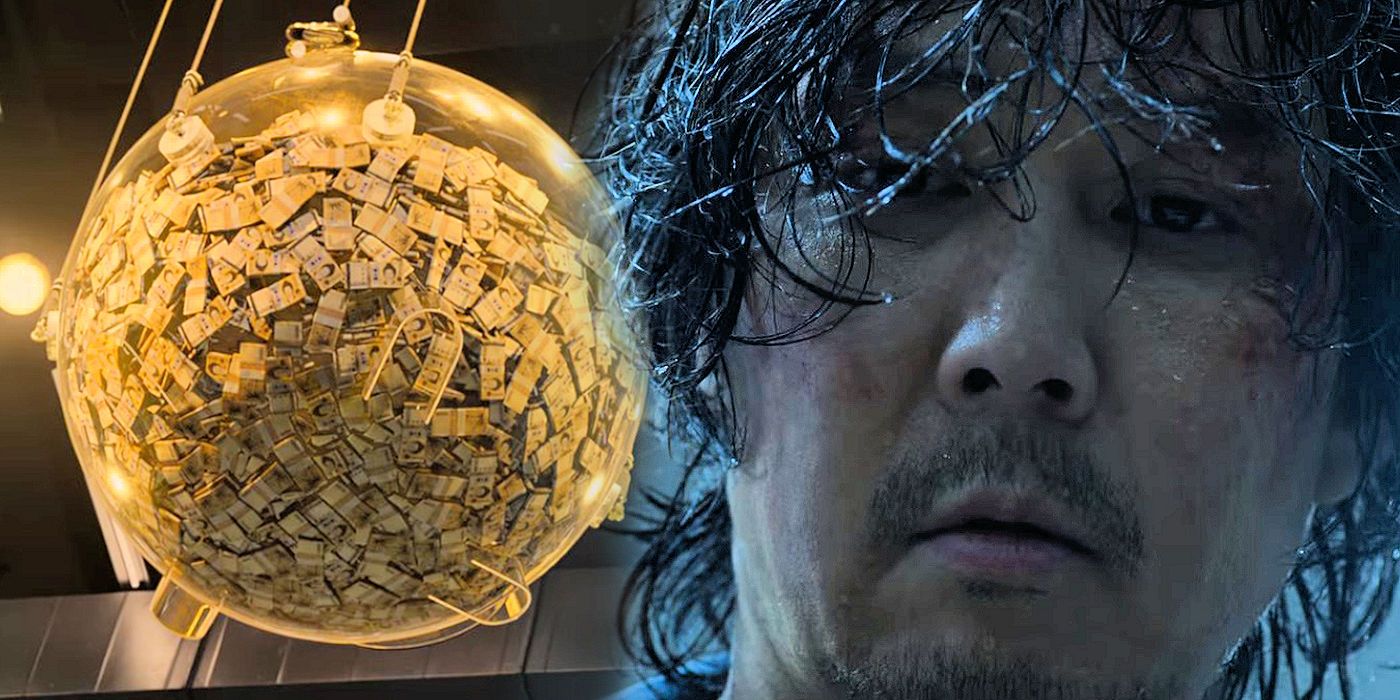Netflix’s Squid Game is getting a lot of comparisons to the dystopian The Hunger Games film series, but the easy connections are missing the point about their fundamental differences. Squid Game has been over a decade in the making, with director Hwang Dong-hyuk writing the script back in 2008. It’s already on the way to becoming one of Netflix’s biggest shows in history, while starting a dialogue among Western viewers for whether the English dub or subtitles are the best manner to watch Squid Game in its original form.
The series has been labeled as a survival drama, which means it’s being categorized with several other notable movies, TV shows, books, and games based on characters fighting for their lives to outlast others. Squid Game follows Seong Gi-hun, a man crippled in debt who is propositioned by a recruiter for “Squid Game” to play children’s games in a more organized manner where if he wins every game, he can go home with billions of Won. The games are shown to be far more high-stake than previously imagined, where players must complete the game without breaking the rules or losing, as the consequences involve immediate death.
Audiences quickly compared Squid Game to the well-known dystopian movies in The Hunger Games franchise, with many saying the latter is the American equivalent of the former. The Hunger Games documents a dystopian future in which teenager Katniss Everdeen volunteers as tribute to replace her sister after she is drafted into the annual Hunger Games, an event where a boy and girl between the ages of 12 and 18 from each of Panem’s districts are chosen through a lottery to fight to the death. The battle royale style of The Hunger Games, especially involving children, has made it an extremely popular series, but its survival-based equivalency to Squid Game isn’t completely accurate.
Why Squid Game Is Being Compared To The Hunger Games
The biggest reason why Squid Game is receiving a lot of Hunger Games comparisons is that the characters are in a setting in which if they lose they die, and winning may mean being the last one standing. While it’s not clear whether there can only be one winner for Squid Game, the prize money goes up when another player dies, so the higher prize money paired with less competition means a lot of Squid Game characters choose to kill other players. For Hunger Games, you either win or you die, and the game is supposed to end when there’s one player left standing after all others have been killed by other players or natural elements. In both cases, the winner walks away with a fortune, though at the cost of killing others and seeing plenty of others wrongfully die.
Another way Netflix’s Squid Game has been tied to The Hunger Games is through the wealthy individuals that fund the game, the rich people that bet on players living or dying for sport, and a gamemaker that can adjust the game’s setting to maximize conflict or death. Those in The Hunger Games’ Capitol as well as Squid Game’s VIPs are wealthy and exploit the poor for enjoyment, with no acknowledgment of the contestants as human beings. The most significant difference between The Hunger Games and Squid Game is that the latter is voluntary, while the former is based on a drawing that every single child is unwillingly entered in.
Squid Game's Biggest Hunger Games Comparison Is Wrong
Early reactions to Squid Game when comparing it to media like The Hunger Games have a common factor in labeling it as dystopian, which is inherently wrong. To be dystopian, Squid Game would have to be set in an imagined, fictional society in which there is intense suffering and/or clear inequality. South Korea's Squid Game absolutely matches the criteria for featuring suffering and inequality, but it doesn’t take place in an imagined or fictional society - it’s set in modern-day South Korea under all of the same confines of real-life civilization, the only difference is that there’s a secret Squid Game where poor people sign up to play children’s games to the death. The Hunger Games, on the other hand, is truly set in a dystopian future, where the setting is a fictional, re-imagined North America under a new societal organization with plenty of details that make it clear it’s not real. The Hunger Games’ dystopian themes and messages relate to real-life class struggles, but it’s not in a modern, accessible society that people are actually living in like Squid Game.
Squid Game's Similarities To The Hunger Games
The overarching similarity between Squid Game and the young adult Hunger Games franchise is its premise of poor people being exploited to fight to the death at the enjoyment and organization of the wealthy. The Hunger Games is clearly a commentary on wealth disparity and capitalistic greed, which is exactly what Squid Game is trying to put forth. Both games also make it increasingly difficult to trust others, because anyone could turn on them and kill them at any moment. They both also share the themes of compromising morality to survive and truly testing the horrors of human nature when either money or glory is at stake. All the while, the rich leisurely watch the poor kill each other or die trying to win from the comfort of their extravagant homes, or they can pay extra to watch in person. Both games also leave the protagonist “winners,” Katniss Everdeen and Seong Gi-hun, with deep trauma and guilt after seeing so many people die for nothing, and they struggle with accepting their prizes because it’s all blood money.
Why Squid Game's Hunger Games Comparison Is Damaging
Comparing Squid Game to The Hunger Games is harmful because it undermines how clearly the themes will resonate with audiences. By setting a series in a dystopian future, there’s a much clearer dissociation between viewers critiquing the movie’s society and easily finding those flaws in their own. The Hunger Games was already critical of capitalism and its dangers, but being set in the future with characters and a society that less clearly reflect modern life makes it harder for the underlying message and cautions to land with viewers. Squid Game's season isn’t in the future or in a made-up, exaggerated society, it takes place now in a way that people are truly living today. If the actual Squid Game event was real, there would absolutely be people signing up knowing the consequences because of one’s debt and trapping governmental policies. By comparing Squid Game to the futuristic Hunger Games right off the bat, the timely message of the Netflix show may be subverted.
Squid Game’s creator has also been adamant in saying the Netflix series is a critique of modern capitalism under the policies, inequalities, and sufferings faced by real people today. According to Variety, each character in Squid Game is inspired by real people that are accessible in all capitalist societies, with Hwang wanting the Squid Game players to reflect individuals that most people have met in real life. The Hunger Games is much more removed from modern or accessible society - characters like Effie Trinket, President Snow, and even Peeta and Katniss aren’t the type of people one meets on the street. The potential of Squid Game to effectively send its message about the inequalities faced by real people today is weakened when it’s equated to an imagined scenario. Squid Game is commenting on the current class struggles and wealth disparities in capitalistic societies, not how they could be in a future setting like The Hunger Games.





